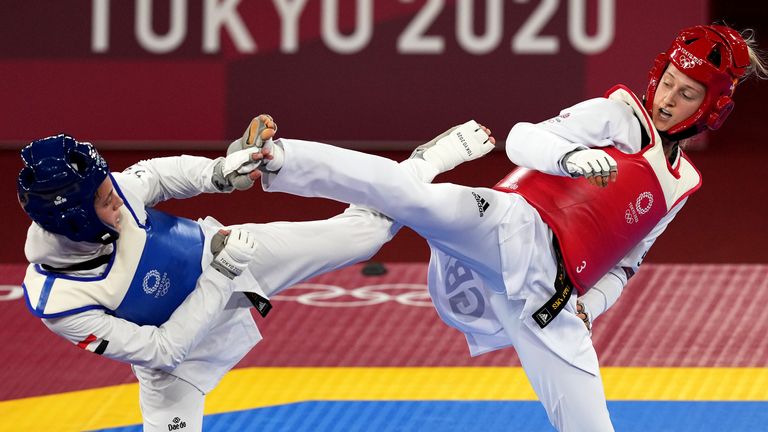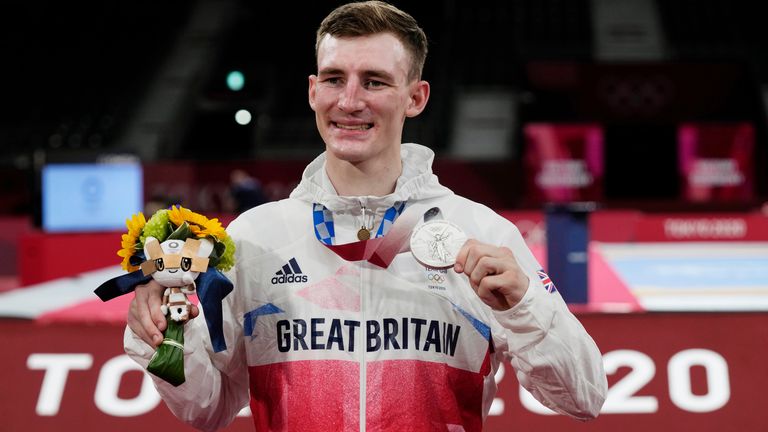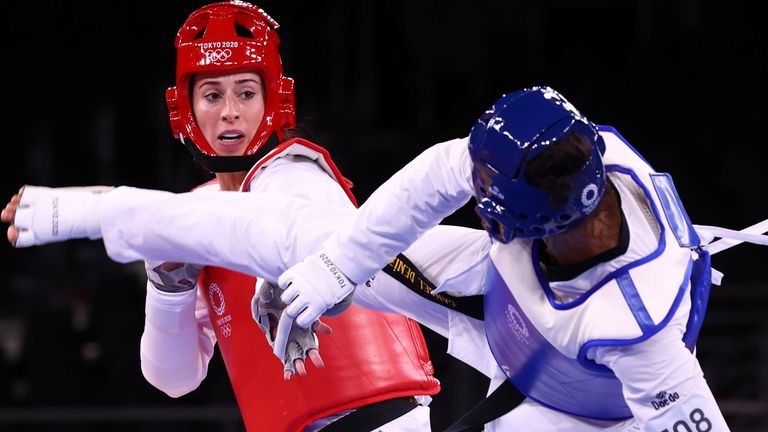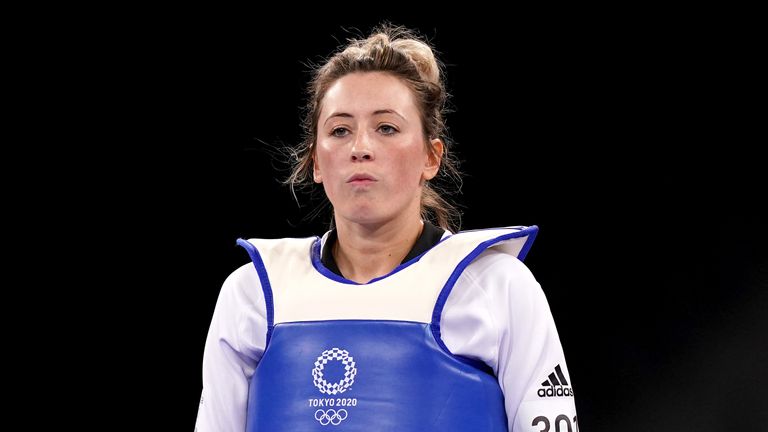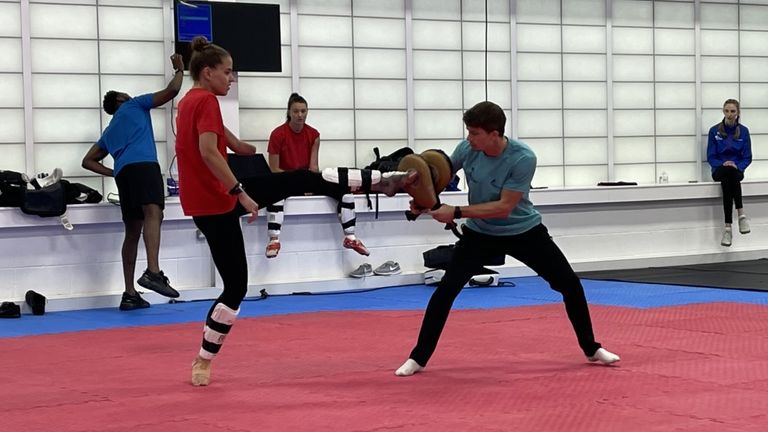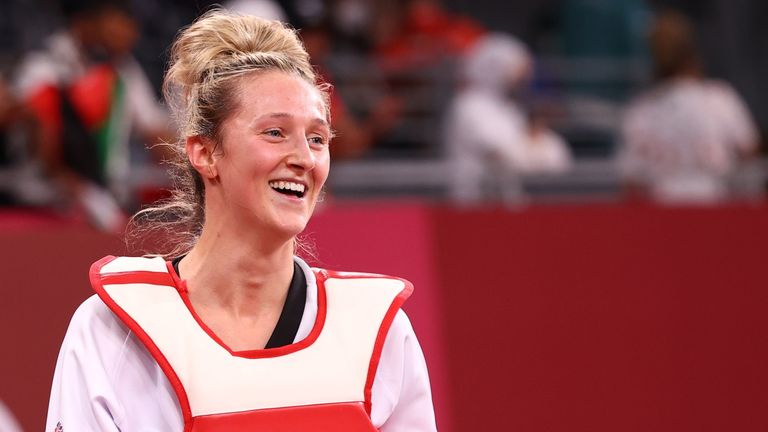Tokyo Olympics: How Britain’s taekwondo athletes went from training at Asda to medal success in Japan
It wasn’t long ago that Britain’s most promising taekwondo athletes were training at a facility at a supermarket.
Dubbed “Aisle 57”, GB Taekwondo’s humble base was within an Asda superstore opposite Manchester City’s stadium before their state-of-the-art national centre opened in 2016.
Competing against countries where the martial art is a “mass participation sport” and even part of the school curriculum, Britain’s taekwondo stars have punched above their weight once again at the Tokyo Olympics after winning three medals.
Lauren Williams achieved silver after narrowly missing out on gold when she lost her lead with just 10 seconds to go in the final.
Bradly Sinden is also taking home silver, having led his final by two points with eight seconds left on the clock.
And Bianca Walkden won a bronze for the second successive Olympics, bouncing back from a final-second loss in her semi-final.
It means that despite Jade Jones’s crushing disappointment as she failed to win a medal despite golds at Rio 2016 and London 2012, it has been another successful Games for British Taekwondo.
“In terms of success and return on investment, I think we’re only second to British Cycling when it comes to medals at the Olympic Games, which is an incredible achievement when you think that we’re not a mass participation sport,” says Ian Gillis, non-executive director at British Taekwondo, the martial art’s governing body.
“It wasn’t that long ago when we were training at a facility at Asda just down the road.
“In the UK, it’s not a mass participation sport. It’s probably one of the minority martial art sports I would say.
“We are constantly coming up against countries where it is a mass participation sport and forms part of their school curriculum.
“That is one of the challenges we have in the sport in terms of attracting talent.”
Taekwondo only became a full-medal Olympic sport at the 2000 Sydney Games – and it would be eight years before a Briton secured a place on the podium.
Sarah Stevenson won bronze at Beijing 2008, before Jade Jones reached new heights at London 2012 by achieving Britain’s first taekwondo Olympic gold.
She defended her Olympic title four years later to win her second gold, while Britain’s Lutalo Muhammad followed up a taekwondo bronze in 2012 with a silver medal at Rio 2016.
After three more medals in the sport at Tokyo 2020, Ian Leafe, chief executive of GB Taekwondo, credits their national training centre in Manchester for bringing the success.
“Like they say for Manchester United, it’s the Theatre of Dreams for our sport,” he tells Sky News.
“It all culminates here and we’re seeing the results on the TV.
“When you see what’s been going on over the last few days, the excitement and the heartache, it’s just incredible.
“Taekwondo as a sport is growing and growing and growing.
“When you look at people at people like Lauren Williams, she was watching Jade Jones in the London Olympic Games and that’s what inspired her to take up the sport and she got to the heights of a silver medal this time.”
Mr Leafe admits their former training facility at Asda was “rather bizarre”.
“You had Asda and Next and between them were blacked-out doors – nobody knew it was there apart from the shouts and screams and the smacks of pads,” he says.
“What the customers thought, we’d never know. We were there for a number of years.
“That’s where they did the strength and conditioning training and we had junior squads there.”
British Taekwondo reportedly received almost £10m in funding for the build-up to Tokyo 2020; with £8.3m awarded ahead of the Paris Games in 2024.
But it is vastly less than the reported £35m awarded to British Cycling for the next Olympics.
Mr Gillis says the success of Britain’s taekwondo athletes in Tokyo is vital as attention turns to Paris after this summer’s Games.
“It’s important in terms of funding because one of our objectives is to win medals,” he tells Sky News.
“But equally it’s always about more than the medals.
“It’s about, what else is the sport trying to do? Attracting the next generation of taekwondo athletes is part of the objective.
“Without the national lottery funding, many of these athletes wouldn’t be able to compete at the highest level.
“It’s very important and we’re very grateful for it.”
It is hoped that the interest in taekwondo at this year’s Olympics will now inspire more people to take up the sport – including those involved in other martial arts.
Mr Gillis, a former national karate champion, says: “We have an initiative called Fighting Chance where we ask people with an interest in combat sports, people who have been martial artists to make that transition, whether that’s from kung-fu, karate or kickboxing.
“Lauren Williams is a good example of that. Lauren was a kickboxer, made the transition over to taekwondo and has just been successful in winning a silver medal out in Tokyo.”
He adds: “We are minority sport, we don’t have mass participation in the UK, but the coverage for GB Taekwondo has been fantastic.”
“Hopefully British Taekwondo will capitalise on that in terms of attracting new members…. who knows, they could be on the podium in years to come with a gold medal around their neck.”
Source: Read Full Article
